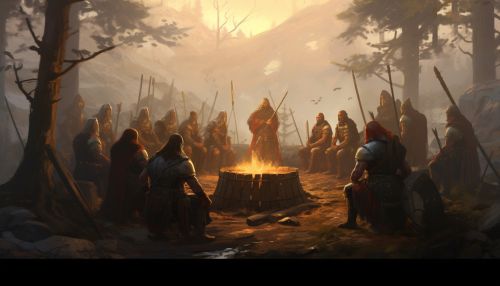Ragnarok
Origins and Etymology
The term "Ragnarok" originates from Old Norse, a North Germanic language once spoken by the inhabitants of Scandinavia. The word is a compound of two words: "ragna," the genitive plural of "regin," or "the ruling powers, gods," and "rok," which has several meanings such as "development, origin, cause, relation, fate." The most accepted translation of Ragnarok is "Fate of the Gods" or "Twilight of the Gods."
Norse Mythology
In Norse mythology, Ragnarok refers to a series of apocalyptic events that will define the end of the world, where giants of frost and fire will band together to fight against the gods in a final battle that will ultimately destroy the planet, submerging it underwater. According to the Norse belief, this cataclysmic event is predestined to happen, but at the same time, its occurrence is not entirely certain because the timeline of when these events will take place is not specified.
Prophesies of Ragnarok
The prophesies of Ragnarok are primarily found in the Poetic Edda, an ancient Viking collection of poems, and the Prose Edda, a 13th-century work by Icelandic historian Snorri Sturluson. These prophesies describe a series of events that will lead to the final battle. The first sign of Ragnarok is the Fimbulwinter, a harsh winter that will last for three years with no summer in between. This will be followed by the disappearance of all moral constraints, leading to the breakdown of social structures.


The Final Battle
The final battle of Ragnarok, according to Norse mythology, will take place on the field of Vigrid. The gods, led by Odin, will fight the giants and the monsters. Odin will engage in combat with the monstrous wolf Fenrir, while Thor will face off against the world serpent Jormungandr. Despite their valiant efforts, the gods will fall in battle, and the world will sink into the sea.
Aftermath and Rebirth
Despite the cataclysmic events of Ragnarok, the world will not be completely obliterated. It is prophesied that the world will resurface anew and fertile, and two humans will survive to repopulate the Earth. The surviving gods will meet, and the world will be repopulated by two human survivors. Thus, Ragnarok is not only the end of the world in Norse mythology but also the beginning of a new one.
Interpretations and Influence
Ragnarok has been interpreted and reinterpreted over the centuries, from the Viking Age to modern times. It has had a profound influence on a variety of media, including literature, video games, and films. The concept of an apocalyptic battle between gods and giants has been a recurring theme in various forms of media, demonstrating the enduring appeal of this ancient Norse myth.
